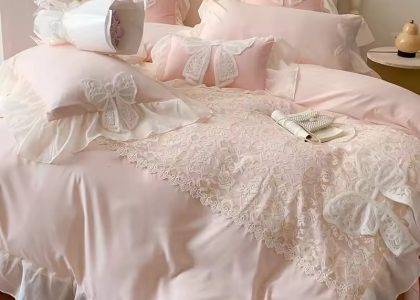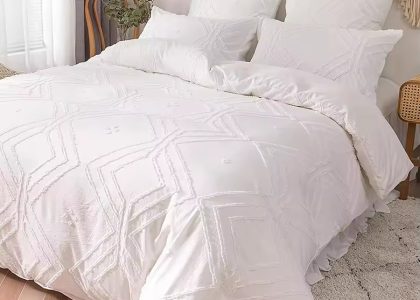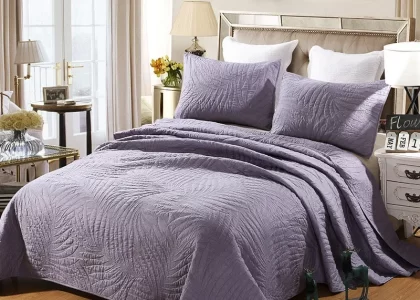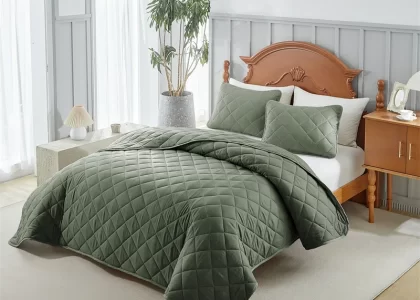 Introduction:
Introduction:
The choice to sleep with or without a pillow is a personal preference, but it can impact your sleep quality and overall health. In this comprehensive guide, we will explore the benefits and drawbacks of sleeping without a pillow, as well as the factors to consider when making this decision.
Pillow Materials:
Cotton: Cotton pillows are soft, breathable, and natural. They are lightweight, hypoallergenic, and easy to care for. Cotton is a popular choice for those who prefer a softer and more traditional pillow feel.
Memory Foam: Memory foam pillows are known for their contouring and pressure-relieving properties. They conform to the shape of the head and neck, providing support and alleviating pain. Memory foam is favored by individuals needing extra support or suffering from neck or back pain.
Down and Feather: Down pillows consist of soft clusters found under the outer feathers of ducks and geese. They provide a luxurious and plush feel while offering good support. Feather pillows contain more feathers and are similar but slightly firmer. Both down and feather pillows offer excellent insulation and require regular fluffing.
Synthetic Fill: Synthetic fill, such as polyester or microfiber, replicates the softness and loft of natural materials. These pillows are often hypoallergenic, affordable, and easy to maintain. Synthetic fill is a suitable option for those with allergies or on a budget.
Latex: Latex pillows are responsive and durable. They provide a balance of support and comfort and are naturally resistant to dust mites and mold. Latex pillows are popular among those seeking a more natural and hypoallergenic option.
Bamboo: Bamboo pillows are filled with shredded bamboo fibers or bamboo-derived memory foam. They are known for their breathability, moisture-wicking properties, and natural antimicrobial qualities. Bamboo pillows are favored by individuals who sleep hot or have allergies.
Pillow Trends:
Eco-Friendly and Sustainable: The demand for eco-friendly and sustainable pillow options is rising. Pillows made from organic or recycled materials, as well as those with natural or plant-based fillings, are gaining popularity.
Cooling Technologies: Pillows with cooling technologies or infused with cooling gels are increasingly sought after. People are looking for sleep products that regulate temperature and promote a cooler sleep environment.
Customization: Customizable pillows that allow individuals to adjust the loft, firmness, or support according to personal preferences are gaining traction. This trend caters to the varying sleep needs of individuals.
Ergonomic Designs: Pillows with ergonomic designs that promote proper alignment and alleviate pressure points are becoming popular. They target specific sleeping positions and provide targeted support for improved comfort.
These trends in pillow materials and types reflect a growing awareness of sustainability, personalization, and sleep-enhancing features. Ultimately, the choice of pillow material and style depends on individual preferences, sleep needs, and any specific health considerations.
Benefits of Sleeping Without a Pillow
Spinal Alignment:
Sleeping without a pillow allows your spine to align naturally, promoting better posture and reducing the risk of neck and back pain.
It can alleviate pressure on the spine and prevent discomfort caused by misalignment.
Improved Breathing:
Sleeping without a pillow can help keep your airways open and unrestricted, allowing for better breathing during sleep.
It may benefit individuals with sleep apnea, snoring, or respiratory conditions.
Fewer Allergy Symptoms:
Pillows can harbor allergens such as dust mites, leading to allergic reactions and respiratory issues.
Sleeping without a pillow eliminates this potential trigger, reducing allergy symptoms and improving sleep quality.
 Drawbacks of Sleeping Without a Pillow
Drawbacks of Sleeping Without a Pillow
Discomfort:
Some individuals may find it uncomfortable to sleep without a pillow, as it can lead to stiffness or soreness in the neck, shoulders, or head.
It may take time for the body to adjust to this change.
Acid Reflux and Heartburn:
For individuals with acid reflux or heartburn, sleeping without a pillow may worsen symptoms.
Elevating the upper body with a pillow can help alleviate acid reflux and promote better digestion.
Facial Wrinkles:
Sleeping without a pillow may increase the risk of developing facial wrinkles, as the face may come into direct contact with the mattress.
This is especially relevant for individuals who sleep on their stomachs.
 Factors to Consider
Factors to Consider
Sleep Position:
The most appropriate sleep position without a pillow differs for each individual.
Back sleepers may find it easier to sleep without a pillow, whereas side sleepers may need more support for proper spinal alignment.
Mattress Type and Firmness:
The type and firmness of the mattress can affect the need for a pillow.
Softer mattresses may require additional support from a pillow, while firmer mattresses may provide enough support on their own.
Sleep-Related Conditions and Individual Needs:
Individuals with specific sleep-related conditions or health issues should consult with their healthcare provider before making a decision about sleeping without a pillow.
Conditions such as sleep apnea, snoring, or chronic neck or back pain may require additional support from a pillow.
 Alternative Pillow Options
Alternative Pillow Options
Rolled Towel or Blanket:
For individuals looking for minimal neck support, a rolled-up towel or blanket can be placed under the neck for some elevation and comfort.
Neck Roll Pillow:
A neck roll pillow is a smaller, cylindrical pillow that provides targeted support for the neck while maintaining a more natural sleep posture.
Orthopedic Pillows:
Orthopedic pillows are specially designed to provide optimal support and alignment for the head, neck, and spine.
These pillows can cater to individual needs, such as neck pain, snoring, or sleep apnea.
 Conclusion:
Conclusion:
The decision to sleep without a pillow depends on individual preferences, sleep positions, and specific needs. While sleeping without a pillow may offer benefits such as improved spinal alignment and reduced allergic reactions, it may also present drawbacks like initial discomfort or worsened acid reflux symptoms.
Considering factors such as sleep position, mattress type, and personal health conditions is important when determining the best sleeping arrangement. Experimenting with alternative pillow options, such as rolled towels, neck roll pillows, or orthopedic pillows, can provide additional support and comfort for those who choose to sleep without a traditional pillow. Ultimately, it is essential to prioritize sleep quality, comfort, and overall health when deciding whether to sleep with or without a pillow.




